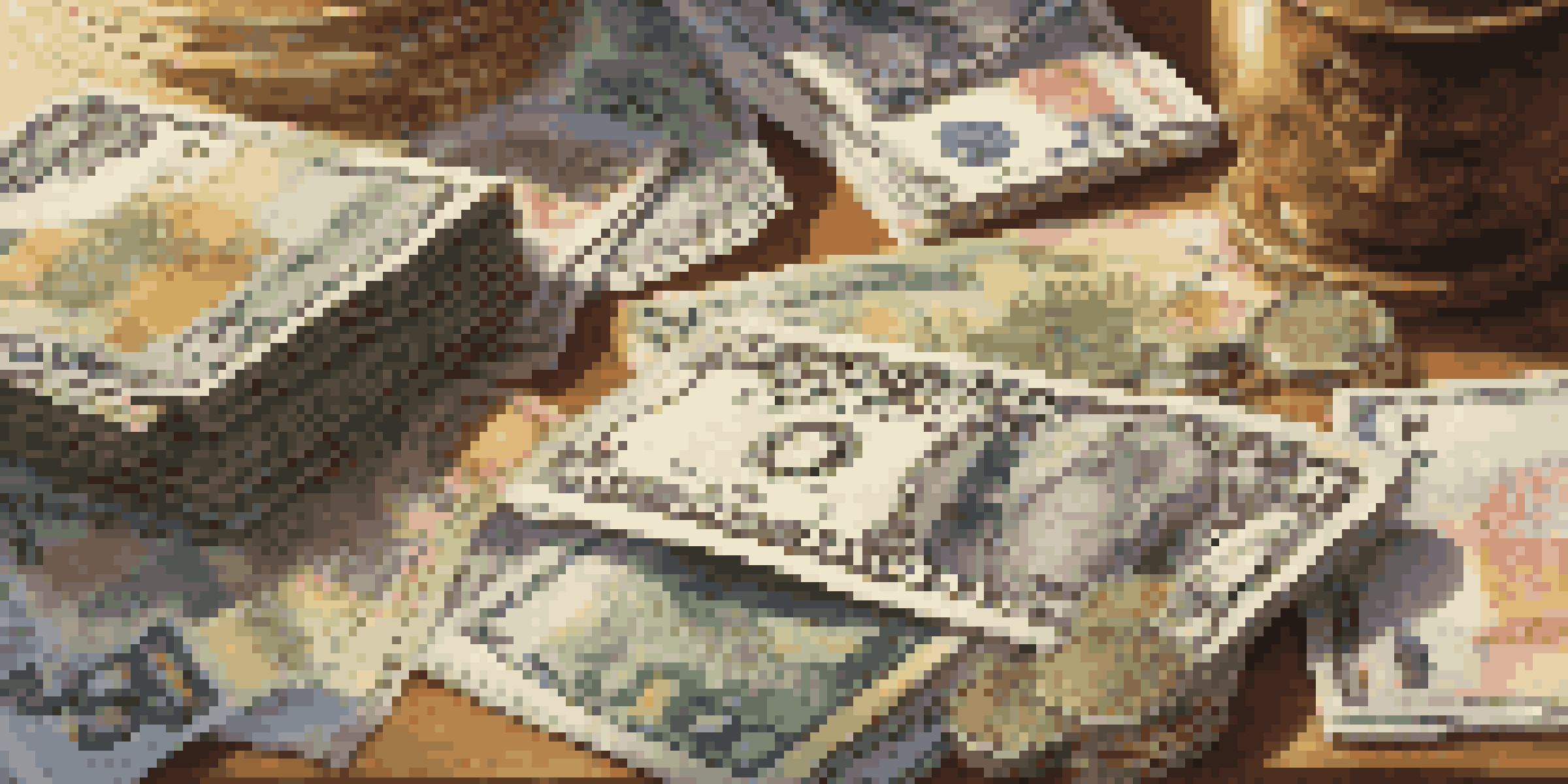Understanding Currency Exchange and Travel Budgeting

What Is Currency Exchange and Why Is It Important?
Currency exchange refers to the process of converting one currency into another, which is essential for international travel. When you travel abroad, you'll need to use the local currency to pay for goods and services, making it crucial to understand how this process works. Not only does it impact your spending power, but it can also affect your overall travel budget.
In the world of finance, timing and information are everything.
For instance, if you're traveling from the U.S. to Europe, knowing the exchange rate between the U.S. dollar and the Euro can help you make informed decisions about how much money to exchange. A favorable exchange rate can stretch your travel budget further, allowing you to enjoy more activities and experiences. Conversely, a poor rate can lead to overspending.
Additionally, understanding currency exchange can help you avoid common pitfalls, such as high fees at airports or tourist areas. By planning ahead and knowing where to exchange your money, you can maximize your budget and reduce unnecessary costs.
How to Research Current Exchange Rates
Before your trip, it's a good idea to research current exchange rates to get a sense of how much local currency you'll need. There are several online platforms and apps that provide real-time exchange rates, which can be incredibly useful for budgeting. Websites like XE.com or currency converter apps can give you a quick snapshot of the rates before you travel.

Another effective strategy is to check the rates offered by banks or currency exchange services in your area. Often, they provide competitive rates compared to what you'll find at airports or hotels, which may charge higher fees. By comparing rates, you can ensure you're getting the best deal for your money.
Understanding Currency Exchange Basics
Currency exchange is vital for international travel, affecting your spending power and overall travel budget.
Remember that exchange rates fluctuate frequently, so it's wise to keep an eye on them as your travel date approaches. Setting a target rate that you're comfortable with can guide your decisions on when and where to exchange your money.
Strategies for Budgeting Your Travel Expenses
Budgeting for travel involves more than just calculating flight and accommodation costs; it’s about planning for daily expenses as well. Start by estimating how much you’ll need for meals, transportation, activities, and souvenirs. A general rule of thumb is to allocate a certain percentage of your total budget for each category, ensuring you cover all your bases.
The best way to predict the future is to create it.
You can also use budgeting apps to track your spending while on the go. Apps like Mint or TravelMapper allow you to input your expenses in real-time, helping you stay on top of your budget. This can be especially helpful when dealing with different currencies, as many apps can convert costs automatically.
Lastly, always leave a little wiggle room in your budget for unexpected expenses. Whether it’s a spontaneous excursion or an emergency, having a small cushion can relieve stress and enhance your travel experience.
Choosing the Right Time to Exchange Currency
Timing your currency exchange can significantly impact your travel budget. Exchange rates can vary from day to day, so keeping an eye on trends can help you make the most of your money. If you notice a favorable trend, it might be worth exchanging a portion of your budget ahead of your trip.
Additionally, avoid exchanging currency at airports unless absolutely necessary, as these locations typically offer the worst rates. Instead, consider withdrawing cash from ATMs upon arrival, as they often provide better rates. Just be mindful of any foreign transaction fees your bank may charge.
Research Exchange Rates Ahead of Time
Monitoring current exchange rates and comparing options can help you make informed decisions and save money.
Lastly, if you're planning to stay in one location for an extended period, consider exchanging larger amounts of cash at once to avoid multiple transactions. This can save you both money and time during your travels.
Understanding Fees and Charges Associated with Currency Exchange
When exchanging currency, it's crucial to be aware of potential fees that can eat into your budget. Banks and exchange services often charge a service fee or commission, which can vary widely. Understanding these charges upfront can help you choose the most cost-effective option for your needs.
For example, some credit cards may charge foreign transaction fees, which can add up quickly if you're making several purchases abroad. Look for cards that don't charge these fees or offer benefits for international travelers. This way, you can minimize costs while maximizing rewards.
It's also wise to read the fine print when using currency exchange services. Some may advertise attractive rates but include hidden fees that negate any savings. By doing your homework, you can ensure you're getting the best value for your money.
Utilizing Local Payment Methods and Currency
In many countries, it’s becoming increasingly common to use local payment methods such as mobile wallets or apps like PayPal and Venmo. These can offer competitive exchange rates and lower fees compared to traditional currency exchange. Familiarizing yourself with local payment options can make transactions smoother and potentially save you money.
However, it’s still essential to have some cash on hand, especially in areas where credit cards may not be accepted. Small vendors, markets, and rural areas often operate on a cash-only basis, so being prepared can prevent any hiccups during your travels.
Plan for Emergencies While Traveling
Having a financial backup plan and travel insurance can provide peace of mind and security against unforeseen expenses.
Finally, consider using a travel credit card that waives foreign transaction fees and offers rewards for international purchases. This can simplify your finances abroad and help you earn benefits while you spend.
Planning for Emergencies and Unforeseen Expenses
No matter how well you plan, emergencies can happen while traveling. Having a financial backup plan is essential for peace of mind. This could mean keeping a small reserve of cash or having a secondary credit card available in case of emergencies.
Additionally, consider purchasing travel insurance that covers unexpected expenses, such as medical emergencies or trip cancellations. Many policies offer assistance for lost or stolen currency, providing further security for your finances while abroad.

Lastly, always inform your bank of your travel plans to avoid any issues with accessing your funds. By taking these precautionary steps, you can navigate any financial hiccups that may arise during your trip.